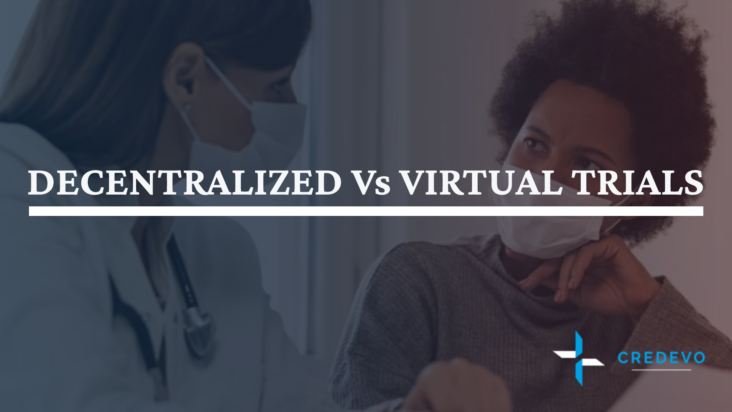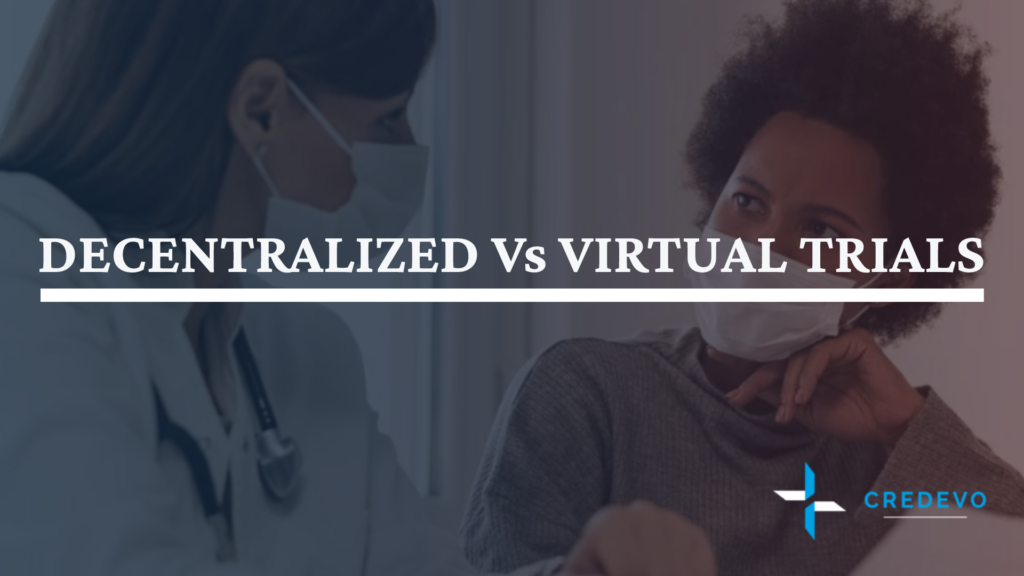Digital Clinical Trials Vs Decentralized ClinicaTrials: Are They Different?

Over the past years, the number of conferences and publications devoted to decentralized and digital clinical trials has skyrocketed in the pharmaceutical research sector. Nearly every clinical research company has joined the conversation, fuelled by the global pandemic.

Conferences are there almost weekly to discuss methods and equipment for transferring laboratory-based research to clinical settings. The use of numerous words and instruments to explain this shift has increased due to this transition.
Researchers use the words “decentralized” and “digital” are frequently to characterize the processes and technologies involved in virtual visits.
Searches for “decentralized vs. digital clinical trials” will always turn up decentralized studies, to the point where the terms are now clinicians routinely use interchangeably.
Decentralized trials
Decentralized clinical trials are “those done employing telemedicine and mobile or local healthcare professionals, using processes and technologies that differ from the normal clinical trial model.”
In these trials, researchers typically conduct remotely rather than at a specific facility, with patients remaining at home for most clinical trials. Here, users use software, mobile apps, and connected devices to interact with websites. These tools provide vital trial data to sites and sponsors while enabling face-to-face interactions with investigators via technology.
Siteless clinical trials, virtual trials, and remote trials are other names for decentralized studies. However, because DCTs frequently involve sites and other facilities, not all of these names are correct.
Examples of decentralized clinical trials in their main forms (DCTs)
Hybrid clinical trials Participants might come in person for trial tasks like screening and enrolment while finishing the balance of the clinical trial online or from home.
Fully remote: In this case, the trial organizer works with sites and directs patient shipping teams, care nurses, and others to ensure the trial runs smoothly without the patient ever having to leave home.
Digital Clinical Trials
The method used to collect clinical trial data defines a “digital trial. A digital clinical trial is one in which no data collection occurs using paper forms at any point in the study.
The original document would still be a paper record, but any paper forms connected to the patient would be digitized and maintained as part of the study.
Any clinical trial, regardless of the location of the clinical visits, can be digital. The study’s data collection method is its distinguishing feature. For digital clinical trials, using solutions that are compatible with regulations and have full audit trails back to source documents is crucial such as;
- electronic medical records
- patient reports and lab results
Clinical trials that combine decentralized and digital methods
Digital and decentralized trials are not the same, despite some similarities. Since digital technologies should be used in a decentralized clinical trial whenever possible, this overlap is most likely where the terminology misconception originated. Utilizing digital systems is frequently necessary for a decentralized clinical trial:
- Video Visits
- Electronic Consent (e Consent)
- Electronic Patient Reported Outcome assessments (ePRO)
- Digital Sensors and Monitoring Devices
Regulators generally recommend these digital solutions but not required for efficient decentralized trial execution. It is possible to conduct a decentralized trial without using specialized digital tools by using telephones, remote/home visits, and paper forms. In practice, this is rarely the case.
Today, the phrase “decentralized trial” connects the use of technological solutions. But the benefits of digital tools go far beyond their application in decentralized clinical trials.
A combined visit model using clinic and decentralized visits is typical for oncology studies. Many oncology procedures and tests cannot be carried out in a distributed environment, which is the root of the problem.
However, there are interim evaluations that the patient can complete at home. Consistent data collection techniques ought to be applied in this situation to enable comparison between assessments. In both cases, using digital tools will help you avoid the well-known issues with paper records.
Digital clinical studies vs decentralized trials
It’s critical to comprehend the differences between digital and decentralized clinical trials. Decentralized clinical trials may use digital methodologies, but a digital clinical trial itself may be decentralized. A decentralized clinical trial contains the following characteristics by definition:
- A separate location from the research facility
- Remote clinical trial visits are made through:
- Going somewhere else to interact with someone in person
- Virtual visits: filing reports online and participating in video conferences
Decentralized trials effectively boost accessibility because they make it easier for those who live elsewhere to participate in the study.
On the other hand, digital clinical trials do not require paper records. Everything is in digital, including data collection techniques. Digital clinical trials, in contrast to decentralized clinical trials, may make use of sophisticated digital tools that are exclusively accessible within a trial center, prohibiting participants from being located in remote locations.
Important characteristics of digital trials
A digital clinical trial has a few distinctive characteristics. The utilization of these elements will determine whether or not the digital experiment allows for decentralization.
A clinical trial is said digital if:
- A digital protocol is a group of digital conditions that guide the operation of other digital systems, including scheduling, evaluations, inclusion and exclusion standards, safety protocols, and more.
- Screening technology – Clinical trial screening platforms will be connected to EMR (Electronic Medical Record) platform at research clinics. Based on data from the digital protocol, this application identifies possible participants, and research staff evaluates its results to determine patient eligibility.
- An eConsent system: The full details of the study, including its advantages and risks, are digitally sent to eligible volunteers via this approach. Patients use digital papers through this technique to give their consent.
- Related systems: A clinical trial management system (CTMS), an electronic data capture (EDC) system, and virtual visit systems are a few examples of relatable digital technologies we can use to collect and manage data.
These essential components enable a trial to run entirely digitally, doing away with paper-based procedures.
Benefits of using digital and decentralized methods in clinical research
More digital and decentralized studies may substitute traditional clinical trials because these kinds of studies provide several benefits, including:
- Enhanced participant recruitment: By using digital tools, participant recruitment and eligibility assessment become more effective, cutting down on wait times and fostering greater transparency and confidence in terms of consent.
- Participants experience less stress because decentralized trials enable involvement from home and because digital communication technologies used in digital trials remove communication obstacles.
- More precise data gathering: Digitization increases the speed and accuracy of data collecting while also improving efficiency.
- Decentralization and digital communication enable several participants from underrepresented or disadvantaged backgrounds.
Digital and decentralized clinical trials have the potential use in the future.
Conclusion
Decentralized and digital trials have different definitions, even though we sometimes use them interchangeably. Decentralized and digital clinical trials have recently garnered popularity as fresh ways to accomplish what clinical trials have traditionally done: collect information from patients utilizing a treatment or medication in a regulated environment and period. Both have the potential to alter the clinical trials, improving both the trial process’ effectiveness and providing trial participants with a better experience.
Do you have any questions related to digital trials or decentralized/virtual/remote clinical trials?
Do you need any of our expertise support in conducting clinical trials. Provide your requirement details below to connect with us and explore our services.